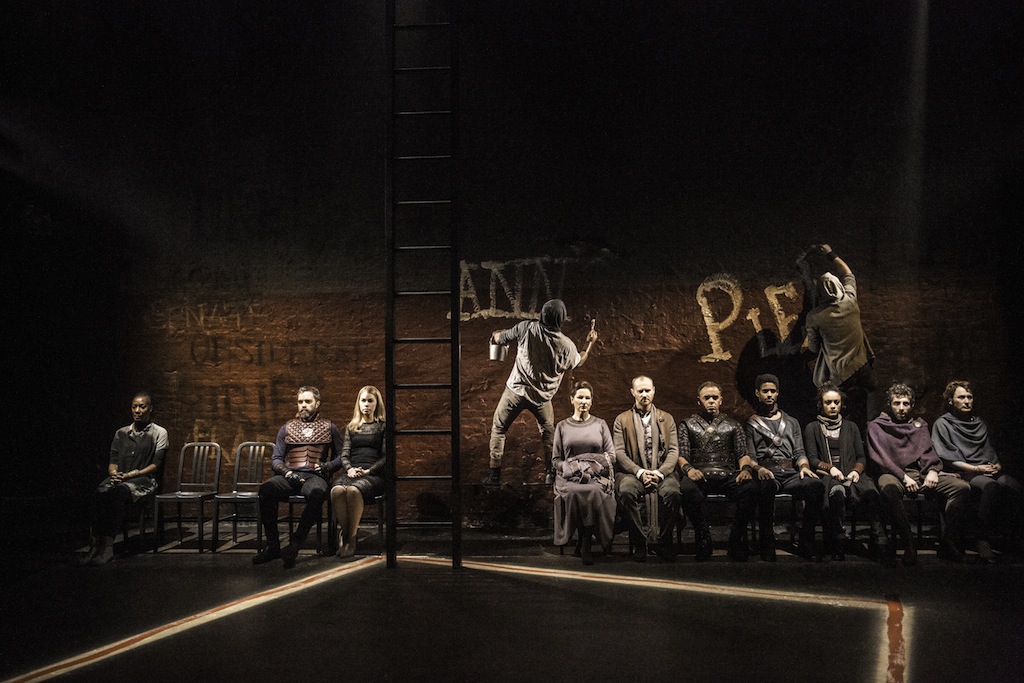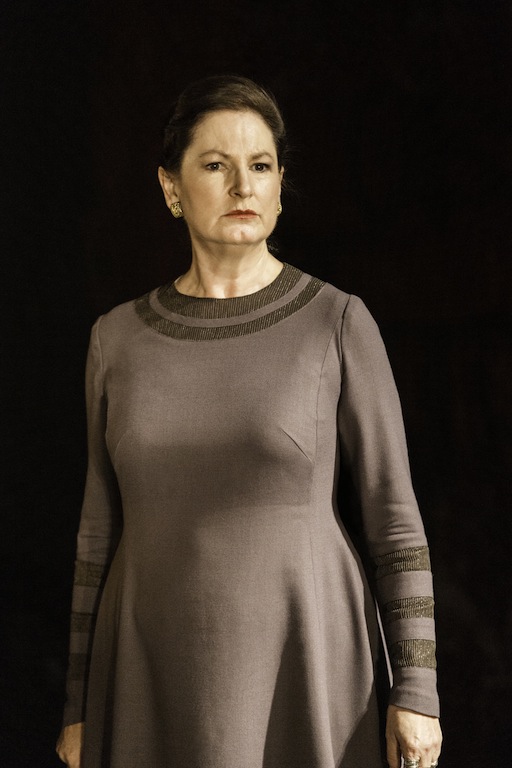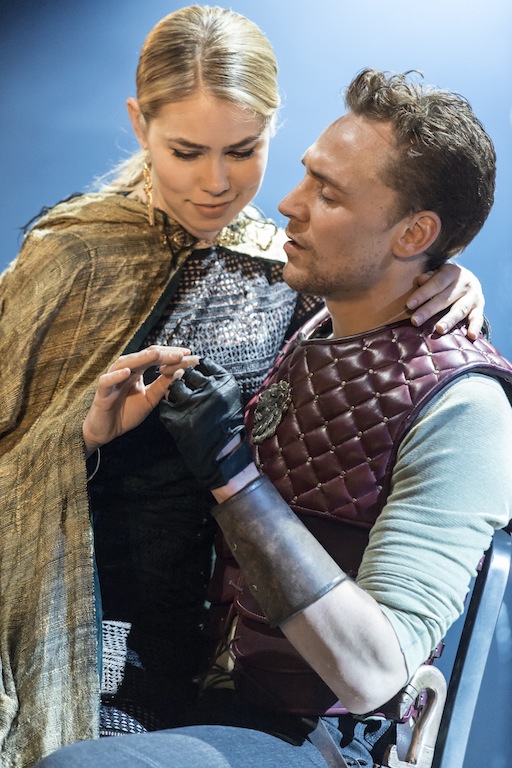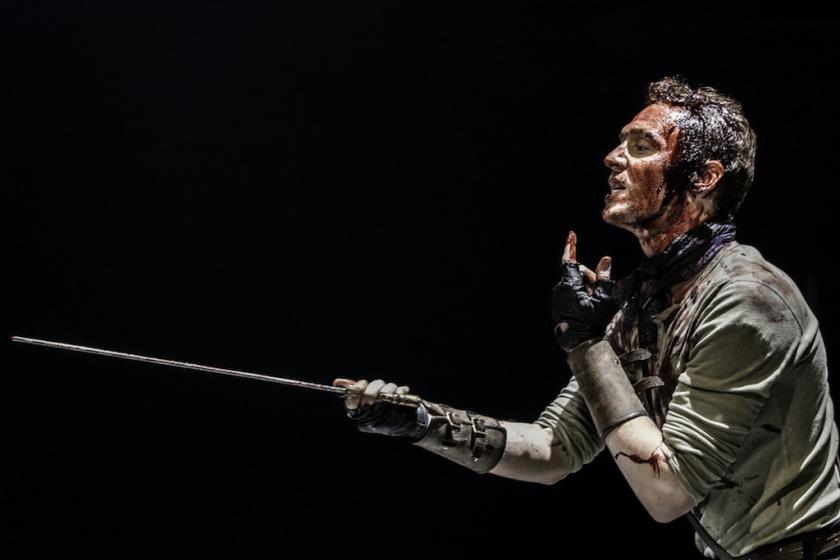In his later life Shakespeare, who never ducked ways to define a hero, offered the public a challenge: Coriolanus is a professional warrior, deaf to reason, patrician hater of people power. To beat all, this man’s man’s a mother’s boy. In a world trying to be newborn in democracy and a big society, Coriolanus sticks out like a sore thumb.
The play’s action is hectic, wracked by war and famine, and the shining simplicities of the sword contrast with the writhing difficulties of words to fashion slow consensus and agreements between people of sharply different motives. Josie Rourke’s production has an exciting contemporary immediacy, right in the face of the audience. The Donmar Warehouse is no war-house; it’s tiny, more a brick workshop than a theatre, but fireworks explode, it’s loud with electronic noises and shouts, darkly coloured and blazingly lit (by Mark Henderson), and there’s blood aplenty, showering, streaming, spurting from a slit stomach. The atmosphere seizes the play out of its source period, back in the mists of Roman antiquity, and makes it now, and that is fine.
Hiddleston's Coriolanus is a golden posterboy, not too much between the ears or under the skin
It’s not that deep, though, or it wasn't last night, when the amount of laughter in the house indicated that some of it rather skims the surface of discomfiting depths. Tom Hiddleston’s Coriolanus is the draw, and he plays the kind of war hero Prime Ministers love: convinced of his calling, a golden posterboy, not too much between the ears or under the skin. He’s a fixed man in a molten time. Handsome Hiddleston arrives in a rush, excellently dressed in a complexly tailored leather waistcoat and scabbard, rather more Gucci than standard-issue (design Lucy Osborne). The war is heard, not seen within the high black and blood-red brick walls, somewhere up above a high ladder into, perhaps, street level from this bunker.
 Up there, metaphorically, is where the simple stuff is - the killing. Hiddleston shins up the ladder with his sword while politicians below extol his brilliance at slaughtering people on behalf of Rome, and comes down again covered in blood, to prove it. Down here on the ground in the gloomy little room (pictured right) is where the complex stuff goes on: where the plebs are attempting to extract a fledgling democracy from the unwilling patricians in the Senate, and where Coriolanus’s mother is boasting about her indomitable, scarred son, itemising his war wounds like medals.
Up there, metaphorically, is where the simple stuff is - the killing. Hiddleston shins up the ladder with his sword while politicians below extol his brilliance at slaughtering people on behalf of Rome, and comes down again covered in blood, to prove it. Down here on the ground in the gloomy little room (pictured right) is where the complex stuff goes on: where the plebs are attempting to extract a fledgling democracy from the unwilling patricians in the Senate, and where Coriolanus’s mother is boasting about her indomitable, scarred son, itemising his war wounds like medals.
There is a lot of excellent work in Rourke’s tight, well-spoken and invigorating production, which fuses a contemporary English buzz about the plebs - mixed race, mixed sex, mixed class - with the archaic emotional stances of Coriolanus and his fearsome mother Volumnia. In one stunning bit of theatre, the bloodied Hiddleston showers after battle, almost crying with the pain that he has concealed so completely in public. In another fizzing scene, Volumnia attempts to persuade her son into a political compromise, waggling his laurel wreath at him from a safe distance, like a liontamer coaxing a dangerous animal.
 Despite these highlights (and a spiffingly gory death), for me Hiddleston isn't yet quite the full-dimensional deal. He skates over the feral, unfathomable polarities of the human being who kills without a flinch of reflection and yet who truly, cleanly, adores his wife. There's surely barbed wire inside Coriolanus’s soul, something bleak and denied, something too uncomfortable to hear about, as the man himself shies away from when the Senate asks him to tell of his great deeds of battle - but Hiddleston’s niceness shines through, and he’s not quite physically convincing as a fighter, too buff (though that’s nice too).
Despite these highlights (and a spiffingly gory death), for me Hiddleston isn't yet quite the full-dimensional deal. He skates over the feral, unfathomable polarities of the human being who kills without a flinch of reflection and yet who truly, cleanly, adores his wife. There's surely barbed wire inside Coriolanus’s soul, something bleak and denied, something too uncomfortable to hear about, as the man himself shies away from when the Senate asks him to tell of his great deeds of battle - but Hiddleston’s niceness shines through, and he’s not quite physically convincing as a fighter, too buff (though that’s nice too).
It’s Deborah Findlay (pictured left) who gives the performance of the night as Volumnia, capable of utter physical ruthlessness, which her son inherited, and of masterly intelligence, which he did not. The only battle Coriolanus loses - and it costs him his life - is his final debate with his mother, tragic inevitability gathering as she argues with him not to make her choose between her country and her son. Findlay’s insistent alto voice carries the argument. It’s only as that persuasive voice stops that you see this ruthless woman knew her son was damned either way, but he’d go out a hero, the way she wanted. Where did Shakespeare summon this woman from? Mother-love on an antique, mythic scale, but also frighteningly human.
 By healing contrast, as Coriolanus’s wife Virgilia, Birgitte Hjort Sørensen (famous as lovely Katrine Fønsmark in Borgen) makes a gentle, silent presence of genuine impact (Sørensen and Hiddleston, pictured right).
By healing contrast, as Coriolanus’s wife Virgilia, Birgitte Hjort Sørensen (famous as lovely Katrine Fønsmark in Borgen) makes a gentle, silent presence of genuine impact (Sørensen and Hiddleston, pictured right).
Bumping up the female quotient in this very male play allows some good speaking by Helen Schlesinger and Rochenda Sandall among the plebs, but Rourke undercuts the male physicality in some of the casting. Peter de Jersey's Cominius apart, this doesn’t yet feel like a Rome full of men ready with a sword. Coriolanus’s great foe-at-arms, Aufidius, needs more muscular forcefulness than Hadley Fraser provides, and Mark Gatiss as the Senator Menenius and Elliot Levey’s tribune Brutus look as if they’d fall over if Volumnia merely blew on them. This might, though, be the point.
The production is broadcast to cinemas live on NT Live on 30 January - recommended.
- Coriolanus is at the Donmar Warehouse, London, till 8 February 2014 (no performances 22-26 December)
Next page: watch Tom Hiddleston talking about the production
Watch Tom Hiddleston talking about the production















Add comment